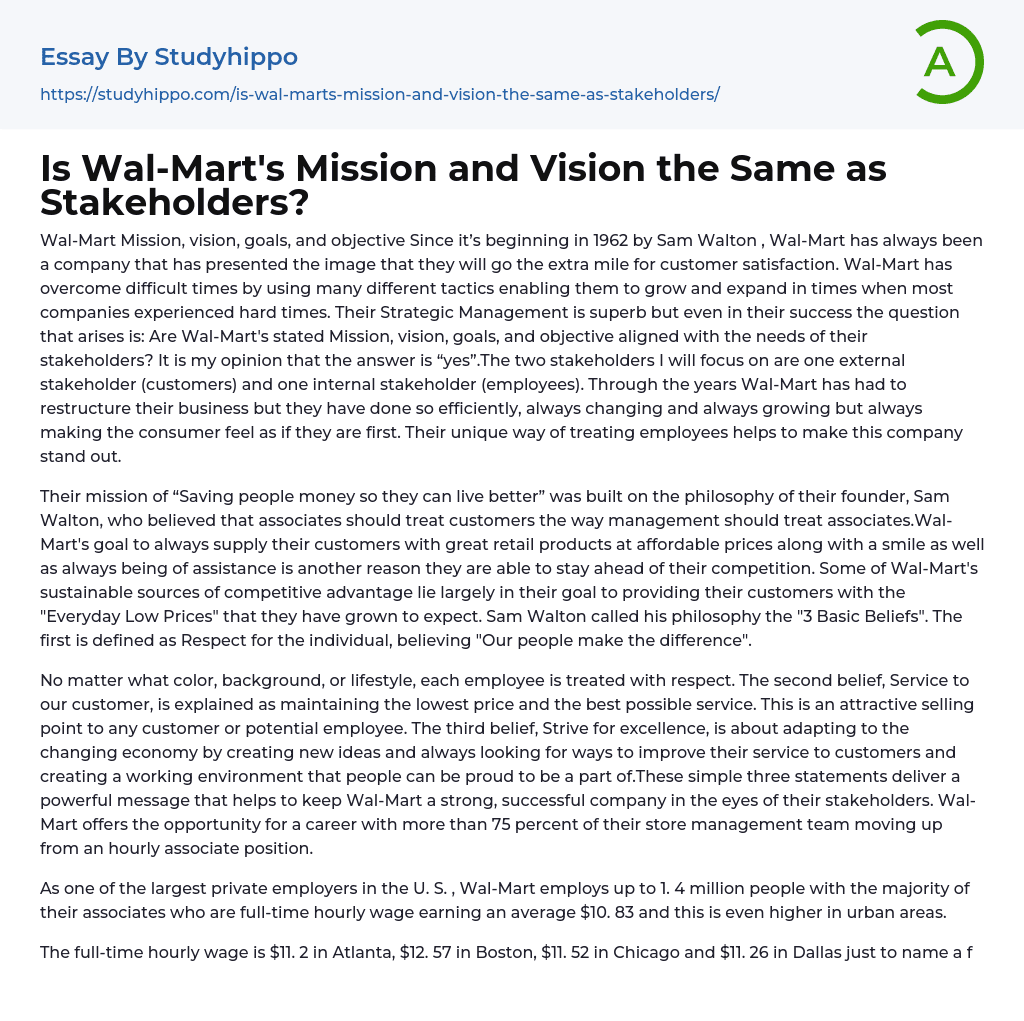

Is Wal-Mart’s Mission and Vision the Same as Stakeholders? Essay Example
Wal-Mart has maintained a customer-oriented image and exceptional service since its establishment by Sam Walton in 1962. Despite facing difficult times, Wal-Mart's various strategies have allowed them to expand and succeed financially. However, the effectiveness of their strategic management raises questions about whether their stated mission, vision, goals, and objectives align with stakeholder needs. I believe they do align, particularly for two key stakeholder groups: customers and employees. Wal-Mart has efficiently undergone significant reorganization while continuously prioritizing customer satisfaction. Their unique approach to employee retention sets them apart from other companies.
Wal-Mart's founder, Sam Walton, believed in treating customers the way management should treat associates, which engendered the mission of "Saving people money so they can live better". Wal-Mart is able to maintain a competitive edge by always offering their customers retail products at pri
...ces they can afford, with a smile and excellent service. Wal-Mart's commitment to providing "Everyday Low Prices" is one of their sustainable sources of competitive advantage. Walton's "3 Basic Beliefs" philosophy includes Respect for the individual, and emphasizes the pivotal role that employees play in the company's success: "Our people make the difference".
Wal-Mart's core value is the fair treatment of all employees, regardless of their race, background or lifestyle. Their goal is to offer the best prices and service possible, which attracts potential customers and workers alike. To maintain its success in the eyes of stakeholders, Wal-Mart prioritizes generating new ideas and improving customer service while fostering an inclusive work environment that everyone appreciates. Moreover, Wal-Mart offers career advancement opportunities with over 75% of their store management team starting as hourly associates.
Wal-Mart is one of the biggest private employers in the US,
with a workforce that can reach up to 1.4 million people. Most of its employees are full-time hourly wage earners and make an average salary of $10.83 per hour, although this amount may be higher in urban areas.
The hourly wages of full-time workers vary across various cities, with rates ranging from $11.2 in Atlanta to $12.57 in Boston and from $11.52 in Chicago to $11.26 in Dallas.
Wal-Mart is exceptional among retail companies for prioritizing the health and wellness of its employees. This is exemplified by their provision of healthcare benefits to both full-time and part-time associates. Given the importance of healthcare in political campaigns, this level of commitment is particularly noteworthy. In fact, 92.7% of Wal-Mart's associates have access to some form of health coverage according to data from open enrollment surveys.
Wal-Mart is a major player in the private health insurance industry in the United States with over 1.1 million insured associates and family members. This success can be attributed to its strong relationships with employees and suppliers, which have helped it achieve a top position among discount retailers. Wal-Mart is committed to improving all aspects of its merchandise while holding suppliers to high standards.
Wal-Mart's approach to staying in business centers on meeting customers' desires for superior goods at affordable rates through the use of influence. The corporation remains dedicated to its mission and objectives while pursuing this goal, and if a supplier is unable to meet their pricing demands, Wal-Mart will look for other options. In promoting sustainable development, Wal-Mart strives to have a positive effect on the neighborhoods where it does business by encouraging economic growth and taking environmental concerns into account when
deciding on store locations.
Wal-Mart prioritizes supporting the local community by volunteering and donating to charitable organizations, exemplified by its donation of $296 million towards various causes in the US in 2007. Additionally, employees and customers contributed an extra $106 million through company-sponsored programs. This level of involvement aligns with community development goals and demonstrates how Wal-Mart stores can benefit both their served communities and suppliers.
According to the perspective of internal stakeholders, joining the Wal-Mart Empire provides prospects for a career and various perks accessible through the enterprise. Wal-Mart's mission statement and three fundamental beliefs create a sense of belonging for their employees, enabling them to envision achieving their individual and economic objectives as part of a larger team.
- American Dream essays
- Barriers To Entry essays
- Capitalism essays
- Central Bank essays
- Compensation essays
- Consumerism essays
- Economic Development essays
- Economic Growth essays
- Economic Inequality essays
- Economic System essays
- Economy essays
- Employment essays
- Export essays
- Finance essays
- Free Trade essays
- Gross Domestic Product essays
- Human Development essays
- Income Inequality essays
- Industry essays
- Inflation essays
- International Business essays
- International Trade essays
- Macroeconomics essays
- Materialism essays
- Max Weber essays
- Microeconomics essays
- Minimum Wage essays
- Monetary Policy essays
- Monopoly essays
- Pricing essays
- Profit essays
- Recession essays
- resources essays
- Taxation essays
- Trade essays
- Unemployment essays
- Warehouse essays
- World economy essays
- Adidas essays
- Amazon essays
- Apple essays
- Bmw essays
- British Airways essays
- Burger King essays
- Coca-Cola essays
- Company essays
- Costco essays
- Dell essays
- Ebay essays
- Enron essays



